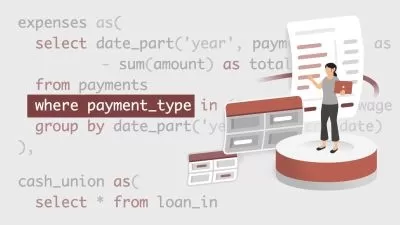MBA ASAP Corporate Finance Fundamentals for Career Success
John Cousins
16:55:50
Description
Concepts & Tools of Financial Analysis, Valuation, Investing, Money Management, and Decision Making. DCF,NPV, IRR & more
What You'll Learn?
- Corporate Finance is the tools and techniques of how companies make decisions about what projects to pursue, and how to value those projects.
- This course provides a framework for how financial professionals make decisions about how, when, and where to invest money.
- You will be able to use these tools and calculations to value assets and make financial decisions relative to investing and allocating resources to projects.
- Hone new skills online with expert faculty.
- What Will I Learn Analyze and understand an income statement (even if you have no experience with income statements).
- Analyze and understand a balance sheet . Analyze and understand a cash flow statement.
- This is the course you pick when you don’t want to waste your time and want the best work done.
- The highest form of self-confidence is believing in your ability to learn.
- What Is an Asset?
- Financial Intelligence for Entrepreneurs (and other non-financial types) Simple Numbers, Straight Talk, Big Profits!
Who is this for?
More details
DescriptionTestimonial from recent student:
The MBA ASAP Corporate Finance Fundamentals course sets you up for success. I have been working in the financial services industry for 2+ years and this really helped me understand the things I don't encounter on the day to day (but should know about). This is a fantastic course to understand the fundamentals of finance. John is an engaging presenter; he speaks encouragingly to the viewer/student and observing him in a classroom setting makes this learning feel like hybrid. A very engaging course, which I will be recommending to my colleagues! Thank you, John!
I was looking for a whole overview course as opposed to the shorter more specialized learnings. I am delighted I chose your course! Hopefully many students will decide to take this course!
Thanks again for everything John! Best of luck with all your future students, they will benefit from this course!
- Kim
“The first half of my life I went to school. The second half of my life I got an education†— Mark Twain
Don't let lack of financial intelligence stop you from getting ahead.
"It is a 5-star course by any means. Contents, way of communication and pace is so much easy that even Non Finance guys can understand easily."Â Â Asad
Financial Intelligence for Entrepreneurs (and other non-financial types)
Simple Numbers, Straight Talk, Big Profits!
This is the course you pick when you don’t want to waste your time and want the best.
Learn how to raise money and invest it wisely. Learn how to analyze and value companies and income producing assets. Make better business decisions and support them with financial analysis and rationale.  Â
This course includes the eBook version of MBA ASAP Corporate Finance, voted best Corporate Finance book of all time by BookAuthority.
Corporate Finance is the Tools and Techniques of how Companies Make Decisions about what Projects to Pursue, and how to Value those Projects.
 Â
Time Value of Money Â
Present Value and Future Value Â
Net Present Value Â
Internal Rate of Return Â
  Â
Ever wonder how the top executives at your company got there and what they think about?
This course provides a framework for how financial professionals make decisions about how, when, and where to invest money. Corporate Finance comprises a set of skills that interact with all the aspects of running a business. It is also extremely helpful in our personal lives when making decisions about buying or leasing, borrowing money, and making big purchases. It provides analytic tools to think about getting, spending, and saving.
The tax law is a series of incentives for entrepreneurs and investors.
The tax laws favor entrepreneurs and investors. That’s because entrepreneurs and investors generally put money into the economy to produce rather than consume.
But, paying taxes is less expensive than failing at business. Be sure to get educated before you begin.
Start acting like an entrepreneur or an investor. That means the first thing you need to do is to increase your financial intelligence by investing in financial education.
  Â
Content and Overview   Â
We will explore the time value of money and develop a set of tools for making good financial decisions, tools like Net Present Value and Internal Rate of Return. We will explore the trade off between risk and return, and how to value income producing assets.   Â
Valuation of companies and assets can seem mysterious. Where do you even begin? How can you value a startup that doesn’t even have any revenues yet? You will gain confidence in your knowledge and understanding of these concepts. Â
The tools of corporate finance will help you as a manager or business owner to evaluate performance and make smart decisions about the value of opportunities and which to pursue. An understanding of Corporate Finance is essential for the professional manager in order to meaningfully discuss issues with colleagues and upper management. You need to be versed in this subject in order to climb any corporate ladder. Get started understanding corporate finance today.    Â
This course is based on my best selling book MBA ASAP Understanding Corporate Finance. Here are some reviews:Â Â
I am a big fan of your books, which make all these difficult topics really easy to understand. This is excellent work.  Adnan Â
After reading John Cousins' book I was finally able to understand a subject that has been, for me, very foreign and intimidating. He makes the topic of corporate finance accessible to people like me who need the knowledge but easily get lost "in the weeds". Clear and very easy to digest and apply! Lizabeth Â
 Â
Having read the ’10 minutes to understanding Corporate Finance’ I can honestly say that it comprises a well-structured and straightforward presentation of the core elements of corporate finance. Nikolaos
 Learn:
· What Is an Asset?
· Profit
· Profit Margin
· Valuation
· Cash Flow Statement
· Income Statement
· Balance Sheet
· Financial Ratios
· Cost-Benefit Analysis
· Lifetime Value
· Overhead
· Costs: Fixed and Variable
· Breakeven
· Amortization
· Depreciation
· Time Value of Money
· Compounding
· Leverage
· Bootstrapping
· Return on Investment (ROI)
· Sunk Costs
· Internal Controls
And much, much more! Â
Knowing finance is power.
Perhaps the most fundamental atomic unit of business is the asset. Understanding what an asset is, why it matters, and why investors paradoxically like asset-light businesses is critical to career success. This is the way I wish I was taught finance!
Who this course is for:
- Anyone interested in learning a skillset that will make you more valuable at your job, help you start something on the side, or let you quit your job and start your own business.
- If you are thinking about an MBA or are enrolled in a program and are preparing to take accounting and finance courses, this course will prepare you for excelling in your program.
- Why take this finance course? Understand the Numbers side of Business Financial Literacy Matters. Senior executives routinely share and discuss financial data with marketing directors, operations chiefs, and other direct reports. But how much do those managers really understand about finance and the numbers? A recent investigation into this question concluded most managers understand not enough to be useful. Asked to take a basic financial-literacy exam—a test that any CEO or junior finance person should easily ace—a representative sample of U.S. managers from C-level executives to supervisors scored an average of only 38%. Lack of financial literacy matters and impacts an organizations ability to optimally perform. Those who can’t speak the language of business can’t contribute much to a discussion of performance and are unlikely to advance in the hierarchy or reach their full potential. Does a lack of financial literacy matter? From a managers’ point of view, it surely does. Those who can’t speak the language of business can’t contribute much to a discussion of performance and are unlikely to advance in the hierarchy. They may get caught off guard by financial shenanigans, as many employees at Enron were. They also are unable to gauge the health of a prospective or current employer. The CFO of a small manufacturing company often asks candidates for engineering positions whether they would like to review the past two years of the company’s financials. None yet have taken him up on the offer—knowing, perhaps, that they could make neither head nor tail of the statements. People don’t tell their bosses that they don’t speak finance. It’s the usual human reluctance to admit ignorance. In a survey managers were asked what happens in meetings when people don’t understand financial data. The majority chose answers reflecting that reluctance, such as “Most people don’t ask because they don’t want to appear uninformed in front of their boss or peers.†Don’t let this be you. Take this course and understand Corporate Finance.
- • Anyone interested in how accounting works (no prior accounting experience is needed). • Anyone interested in how finance works (no prior finance experience is needed). • Anyone interested in how financial modeling works (no prior modeling experience is needed). • Anyone interested in how valuation works (no prior valuation experience is needed). • Anyone interested in how financial ratios work (no prior financial ratios experience is needed). • Anyone interested in understanding the Time Value of Money, and interest rates. (no prior knowledge required) • Anyone interested in finally understanding DCF, NPV and IRR with no prior knowledge required.
Testimonial from recent student:
The MBA ASAP Corporate Finance Fundamentals course sets you up for success. I have been working in the financial services industry for 2+ years and this really helped me understand the things I don't encounter on the day to day (but should know about). This is a fantastic course to understand the fundamentals of finance. John is an engaging presenter; he speaks encouragingly to the viewer/student and observing him in a classroom setting makes this learning feel like hybrid. A very engaging course, which I will be recommending to my colleagues! Thank you, John!
I was looking for a whole overview course as opposed to the shorter more specialized learnings. I am delighted I chose your course! Hopefully many students will decide to take this course!
Thanks again for everything John! Best of luck with all your future students, they will benefit from this course!
- Kim
“The first half of my life I went to school. The second half of my life I got an education†— Mark Twain
Don't let lack of financial intelligence stop you from getting ahead.
"It is a 5-star course by any means. Contents, way of communication and pace is so much easy that even Non Finance guys can understand easily."Â Â Asad
Financial Intelligence for Entrepreneurs (and other non-financial types)
Simple Numbers, Straight Talk, Big Profits!
This is the course you pick when you don’t want to waste your time and want the best.
Learn how to raise money and invest it wisely. Learn how to analyze and value companies and income producing assets. Make better business decisions and support them with financial analysis and rationale.  Â
This course includes the eBook version of MBA ASAP Corporate Finance, voted best Corporate Finance book of all time by BookAuthority.
Corporate Finance is the Tools and Techniques of how Companies Make Decisions about what Projects to Pursue, and how to Value those Projects.
 Â
Time Value of Money Â
Present Value and Future Value Â
Net Present Value Â
Internal Rate of Return Â
  Â
Ever wonder how the top executives at your company got there and what they think about?
This course provides a framework for how financial professionals make decisions about how, when, and where to invest money. Corporate Finance comprises a set of skills that interact with all the aspects of running a business. It is also extremely helpful in our personal lives when making decisions about buying or leasing, borrowing money, and making big purchases. It provides analytic tools to think about getting, spending, and saving.
The tax law is a series of incentives for entrepreneurs and investors.
The tax laws favor entrepreneurs and investors. That’s because entrepreneurs and investors generally put money into the economy to produce rather than consume.
But, paying taxes is less expensive than failing at business. Be sure to get educated before you begin.
Start acting like an entrepreneur or an investor. That means the first thing you need to do is to increase your financial intelligence by investing in financial education.
  Â
Content and Overview   Â
We will explore the time value of money and develop a set of tools for making good financial decisions, tools like Net Present Value and Internal Rate of Return. We will explore the trade off between risk and return, and how to value income producing assets.   Â
Valuation of companies and assets can seem mysterious. Where do you even begin? How can you value a startup that doesn’t even have any revenues yet? You will gain confidence in your knowledge and understanding of these concepts. Â
The tools of corporate finance will help you as a manager or business owner to evaluate performance and make smart decisions about the value of opportunities and which to pursue. An understanding of Corporate Finance is essential for the professional manager in order to meaningfully discuss issues with colleagues and upper management. You need to be versed in this subject in order to climb any corporate ladder. Get started understanding corporate finance today.    Â
This course is based on my best selling book MBA ASAP Understanding Corporate Finance. Here are some reviews:Â Â
I am a big fan of your books, which make all these difficult topics really easy to understand. This is excellent work.  Adnan Â
After reading John Cousins' book I was finally able to understand a subject that has been, for me, very foreign and intimidating. He makes the topic of corporate finance accessible to people like me who need the knowledge but easily get lost "in the weeds". Clear and very easy to digest and apply! Lizabeth Â
 Â
Having read the ’10 minutes to understanding Corporate Finance’ I can honestly say that it comprises a well-structured and straightforward presentation of the core elements of corporate finance. Nikolaos  Learn:
· What Is an Asset?
· Profit
· Profit Margin
· Valuation
· Cash Flow Statement
· Income Statement
· Balance Sheet
· Financial Ratios
· Cost-Benefit Analysis
· Lifetime Value
· Overhead
· Costs: Fixed and Variable
· Breakeven
· Amortization
· Depreciation
· Time Value of Money
· Compounding
· Leverage
· Bootstrapping
· Return on Investment (ROI)
· Sunk Costs
· Internal Controls
And much, much more! Â
Knowing finance is power.
Perhaps the most fundamental atomic unit of business is the asset. Understanding what an asset is, why it matters, and why investors paradoxically like asset-light businesses is critical to career success. This is the way I wish I was taught finance!
Who this course is for:
- Anyone interested in learning a skillset that will make you more valuable at your job, help you start something on the side, or let you quit your job and start your own business.
- If you are thinking about an MBA or are enrolled in a program and are preparing to take accounting and finance courses, this course will prepare you for excelling in your program.
- Why take this finance course? Understand the Numbers side of Business Financial Literacy Matters. Senior executives routinely share and discuss financial data with marketing directors, operations chiefs, and other direct reports. But how much do those managers really understand about finance and the numbers? A recent investigation into this question concluded most managers understand not enough to be useful. Asked to take a basic financial-literacy exam—a test that any CEO or junior finance person should easily ace—a representative sample of U.S. managers from C-level executives to supervisors scored an average of only 38%. Lack of financial literacy matters and impacts an organizations ability to optimally perform. Those who can’t speak the language of business can’t contribute much to a discussion of performance and are unlikely to advance in the hierarchy or reach their full potential. Does a lack of financial literacy matter? From a managers’ point of view, it surely does. Those who can’t speak the language of business can’t contribute much to a discussion of performance and are unlikely to advance in the hierarchy. They may get caught off guard by financial shenanigans, as many employees at Enron were. They also are unable to gauge the health of a prospective or current employer. The CFO of a small manufacturing company often asks candidates for engineering positions whether they would like to review the past two years of the company’s financials. None yet have taken him up on the offer—knowing, perhaps, that they could make neither head nor tail of the statements. People don’t tell their bosses that they don’t speak finance. It’s the usual human reluctance to admit ignorance. In a survey managers were asked what happens in meetings when people don’t understand financial data. The majority chose answers reflecting that reluctance, such as “Most people don’t ask because they don’t want to appear uninformed in front of their boss or peers.†Don’t let this be you. Take this course and understand Corporate Finance.
- • Anyone interested in how accounting works (no prior accounting experience is needed). • Anyone interested in how finance works (no prior finance experience is needed). • Anyone interested in how financial modeling works (no prior modeling experience is needed). • Anyone interested in how valuation works (no prior valuation experience is needed). • Anyone interested in how financial ratios work (no prior financial ratios experience is needed). • Anyone interested in understanding the Time Value of Money, and interest rates. (no prior knowledge required) • Anyone interested in finally understanding DCF, NPV and IRR with no prior knowledge required.
User Reviews
Rating
John Cousins
Instructor's Courses
Udemy
View courses Udemy- language english
- Training sessions 123
- duration 16:55:50
- Release Date 2022/12/11
















